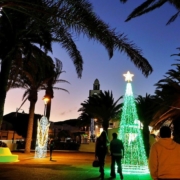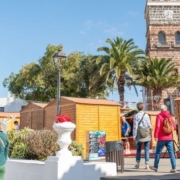2024 brought record numbers of tourists to Lanzarote and the Canary Islands, and there are no indications that the year to come will be any less busy. Tourism is the main business of the islands, and business is good. But more and more people are asking “at what cost?”
3.3 million tourists arrived on Lanzarote last year, an all-time record that shows that the industry has not only fully recovered following its virtually complete collapse during the Covid pandemic but has gone on to perform even more strongly since.
However, last year also saw a backlash to that success, as the Canaries saw two rounds of protests against the effects of mass tourism on the local population. On Lanzarote, a chronic housing crisis, endless water cuts, increasing pressure on public services and environmental damage have all led to dissatisfaction – not so much with tourists, but with the way local authorities are managing them.
Nevertheless, a recent report also indicates the benefits that tourism brings to a bunch of remote islands a hundred miles off the African coast. The report, produced by the Tenerife Business Confederation, indicates that economic growth on the Canaries is strongly dependent on tourism, with the islands of Lanzarote and Fuerteventura leading the way. GDP per head on Lanzarote is the highest on any of the islands, at €26,267 – almost €3,000 higher than the Canarian average.
The two eastern islands have seen their GDP increase by 50% over the last decade, compared to far more moderate growth in the non-tourist islands of La Palma, El Hierro and La Gomera, where growth was around 10% or less. The largest islands of Tenerife and Gran Canaria, with more diverse economies, saw growth of 31%.
However, tourist numbers and economic growth are not the only thing that has increased on Lanzarote. The island also has more residents than ever before (166,476), record numbers of cars on the roads, record numbers of planes arriving at the airport and cruisers arriving at the cruise ports.
Meanwhile, the continued importance of the British market remains especially clear on Lanzarote. While the British account for around 40% of all foreign tourism to the Canaries, that figure regularly reaches over 50% on Lanzarote.
According to José María Mañaricua of the tourist federation FEHT, “The Canary Islands have grown a lot this year thanks to the UK, but if that market falters we will have problems.”











Leave a Reply
Want to join the discussion?Feel free to contribute!